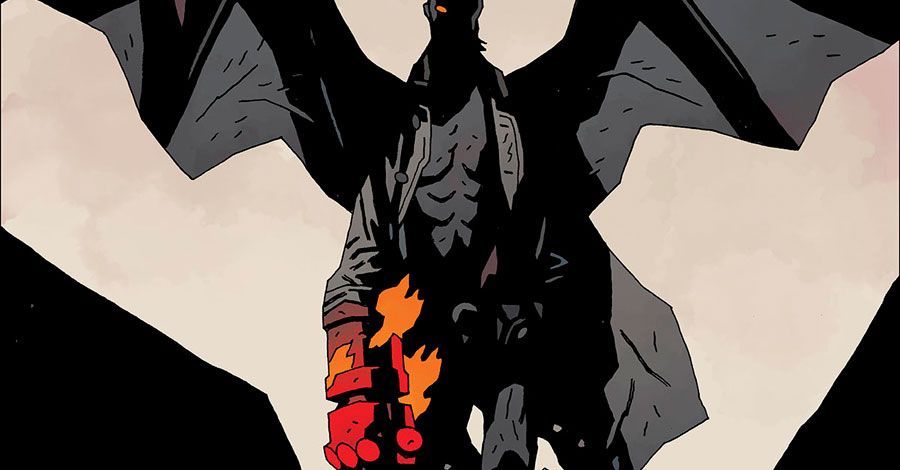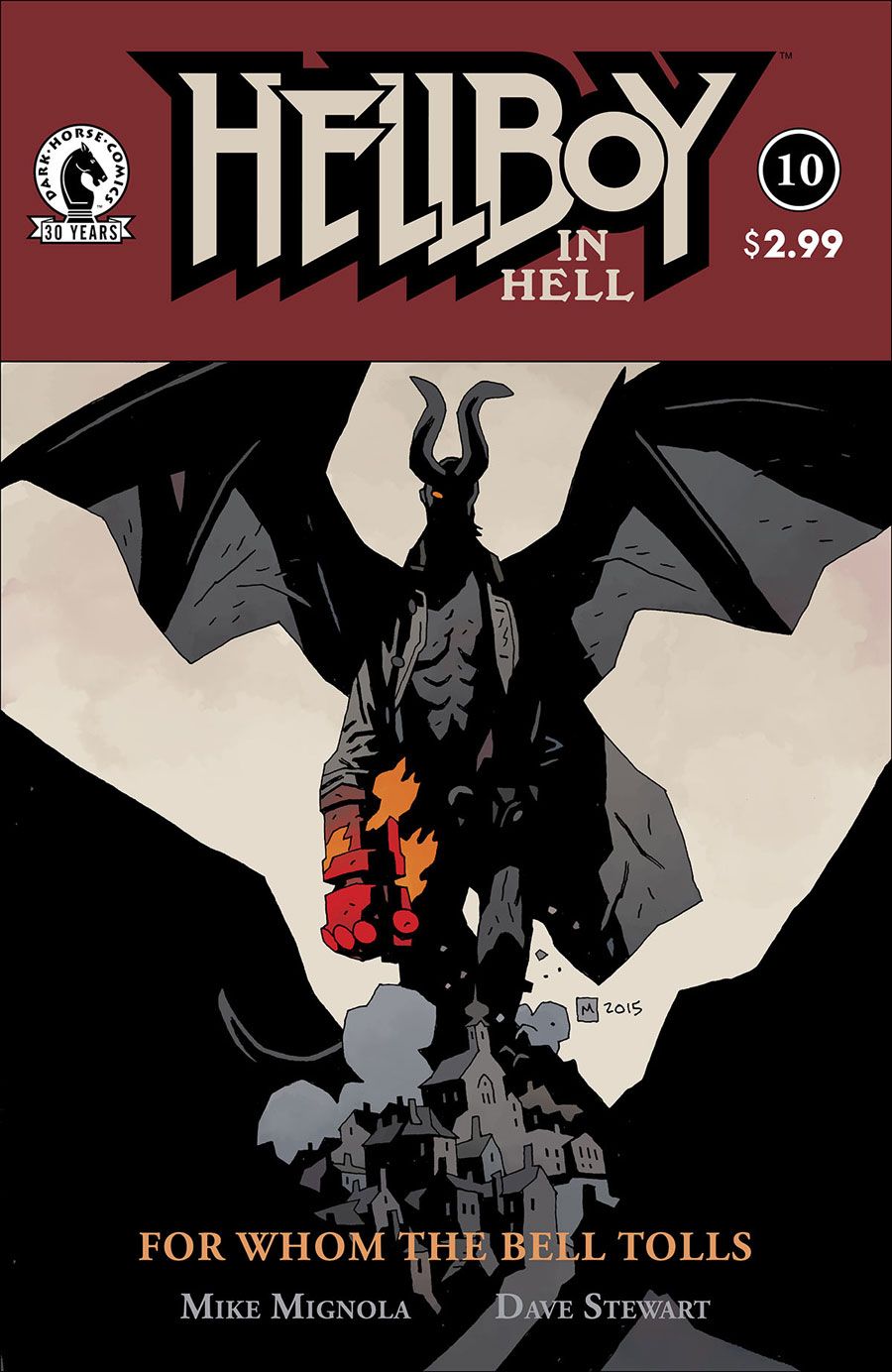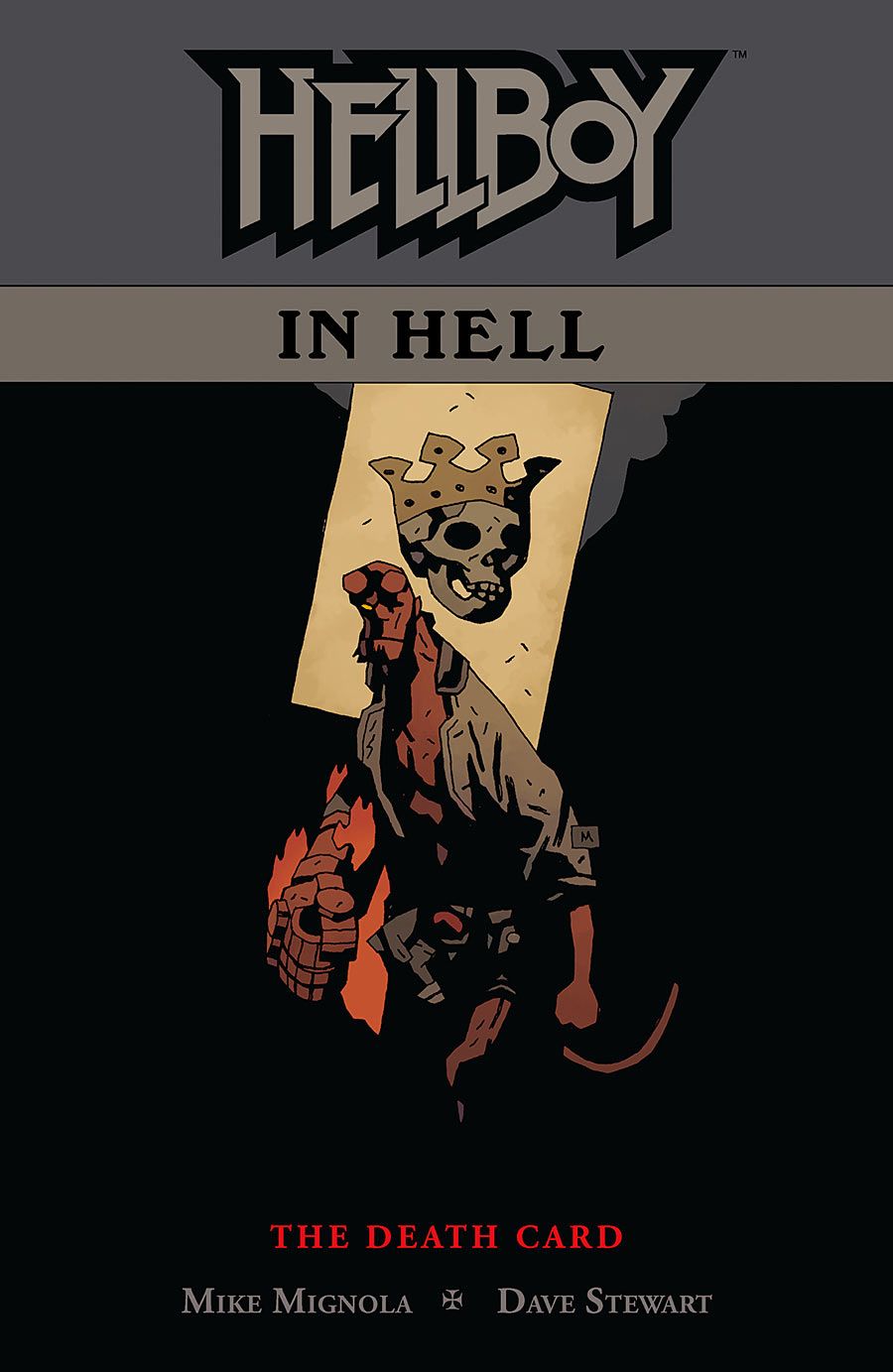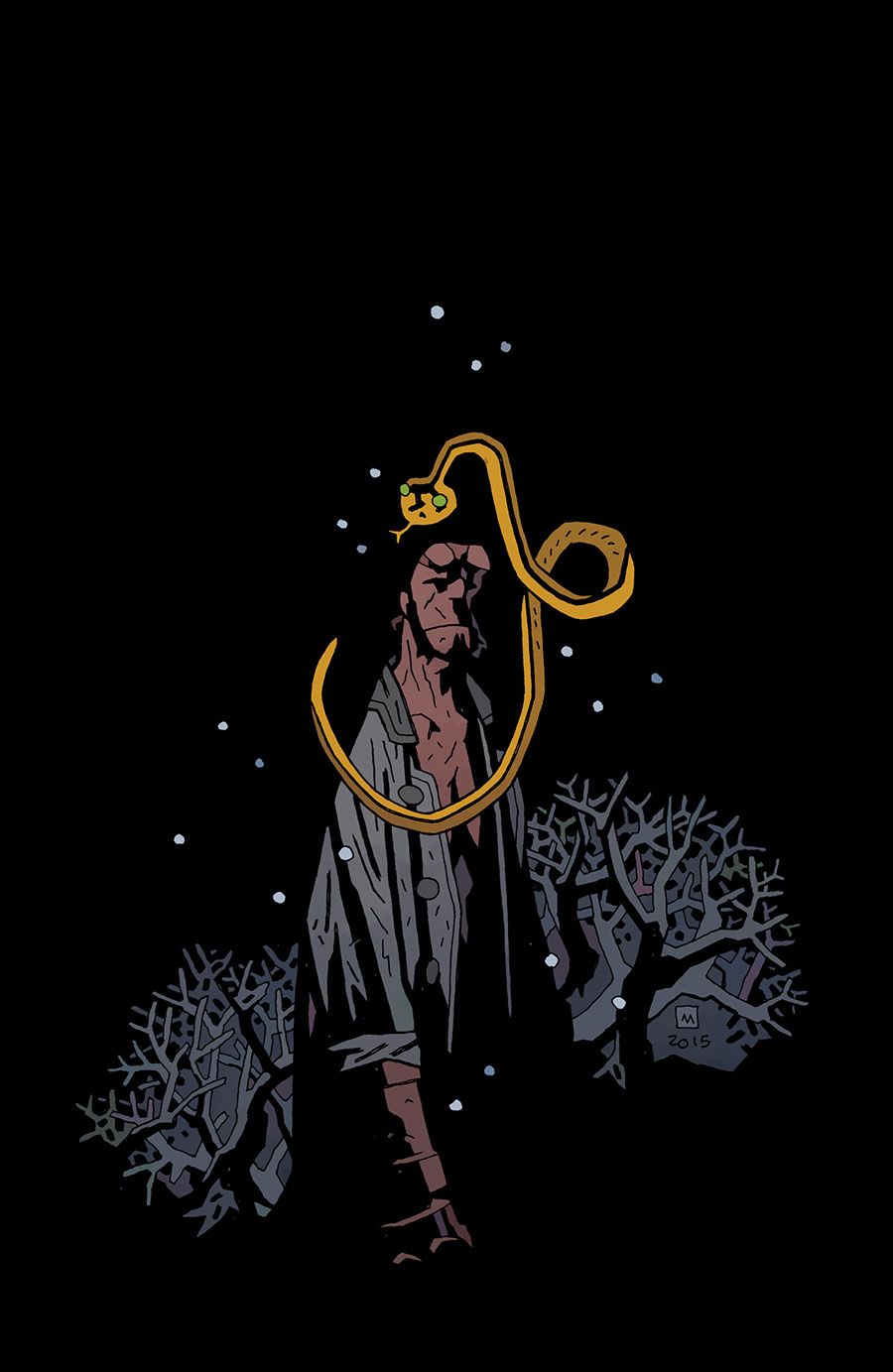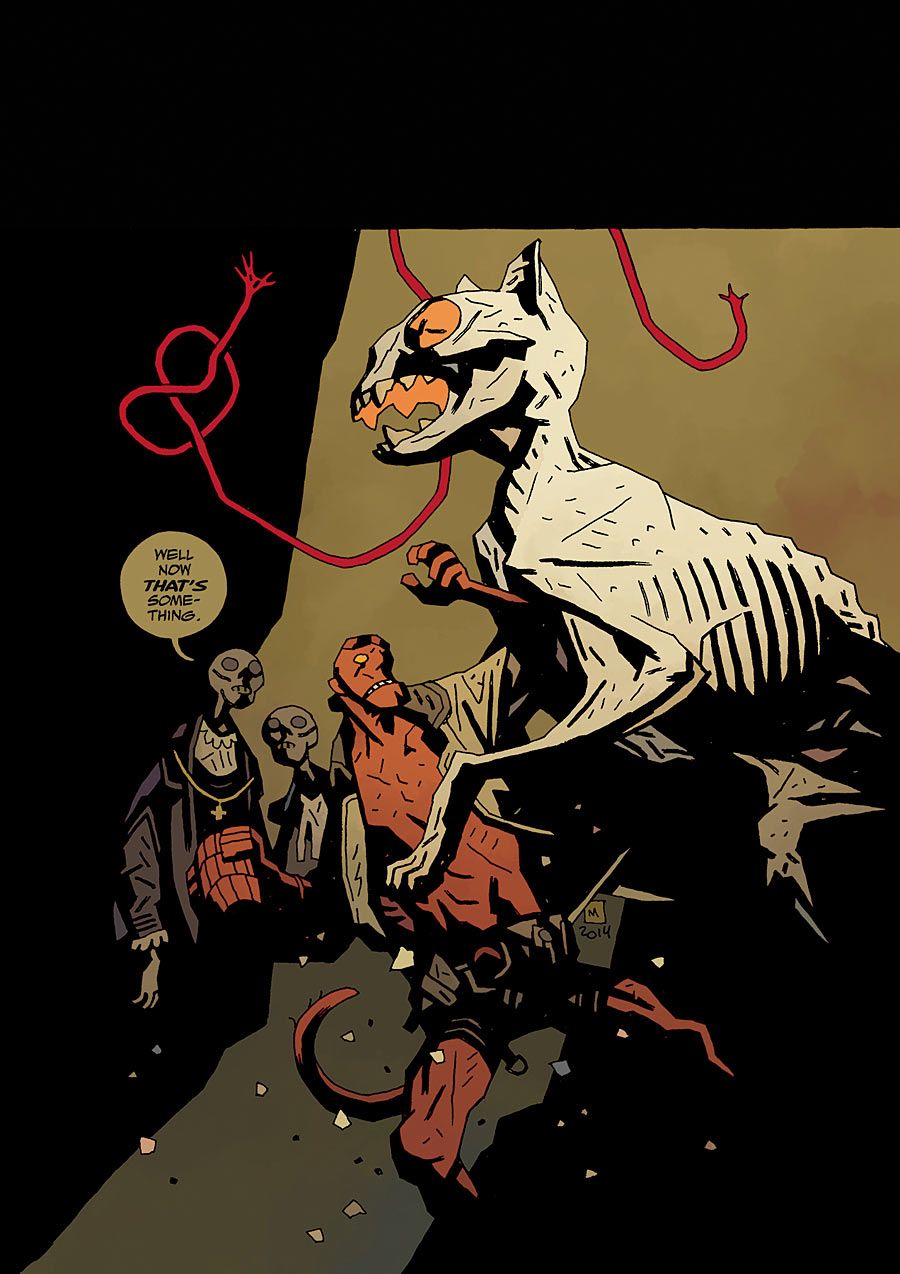Mike Mignola says when a character dies in the Hellboy universe, it only makes them more interesting. So while there's no chance of seeing "Hellboy: Rebirth" when Mignola returns to comics in 2017, we probably also shouldn't expect "Hellboy in Hell" #10, the Dark Horse Comics series' final issue, out June 1, to be the last time the artist/writer crafts a tale about his popular character.
RELATED: Mike Mignola On "Hellboy 3's" Odds: "I'll Believe It When I See It"
The 12-time Eisner Award winning writer-artist tells CBR News he's not sure if he'll ever team with colorist Dave Stewart to illustrate Hellboy's adventures again, as he feels he's illustrated everything he wants to draw featuring the character. So while, Mignola does have more tales plotted out for his demonic protagonist, there's a good chance he'd only return as the author if and when those stories are told.
CBR News: While "Hellboy in Hell" marks the end -- for now -- for Hellboy, let's start back at the beginning. Is it true that the concept was originally pitched to DC Comics?
Mike Mignola: I've heard that a couple of times and no, it's ridiculous. It's preposterous. I never pitched "Hellboy" to anybody. Well, I guess I pitched it to Mike Richardson, but we'd already come up with this idea. Dark Horse wanted me to do something for them. I'd gotten together with Frank Miller and John Byrne and all of those other guys, and we created that idea of the Legend imprint. We went to Dark Horse and said that we wanted them to publish our books and wanted this second imprint. And Dark Horse said, "Fine." Mike said to me, "What are you going to do?" I said, "Hellboy," and he said, "Fine." That was it.
So, no, I never pitched it to DC. I never would have taken it to DC or Marvel. Even when they were supposedly doing creator-owned stuff -- I saw their creator-owned contract once, and maybe it's gotten better over the years -- it was horrifying. I wanted to take it some place where I would actually own it.
Okay, let's stick with the myth-busting. Did Hellboy originate as a sketch at a con in the 1990s?
Yes, I did it as a drawing that appeared in a convention book. I was doing a convention, and they said they wanted a piece of art for the program book. Since I wasn't known for one particular thing, I just drew a monster. At the last minute, I wrote "Hell Boy" on it. He had a belt buckle kind of thing, and I just wrote "Hell Boy" on there. I thought that was really funny. That was really it. I wasn't trying to create a character. I did this thing as a goof, but I thought the name "Hell Boy" was really funny.
A couple of years later, when I started thinking about doing a creator-owned book, I thought of him because I'd drawn monster characters like him a few times just for fun. I thought, if I was going to do something, maybe this would work. And, maybe, I'll get to draw it for a length of time, so let me come up with something that might be fun to draw. And since I'd drawn this character for fun, let's make him our main character. I changed him radically and added that hand, but that's the kind of thing I liked to draw just for fun, and that's the only name that I've ever come up with. So I thought, let's use that kind of guy and let's use that name.
You mentioned that hand. Tell us something about the Right Hand of Doom that nobody else knows.

I grew up reading Jack Kirby comics, and it felt like a very Kirby kind of thing. It was basically Thor's hammer. I needed him to have something to hit something with. There was no thought at the beginning as to what that hand was, it was just something that had a Kirby kind of feel to it. That's really it. It was amazing to me that for years nobody really asked what the hand was, or what did it mean. Finally, I did a story called, "The Right Hand of Doom," which actually wasn't even really a story. [Laughs] Nobody was asking about this hand, so I just did a story where I talk about the hand just so readers would say, "Oh, yeah. I guess there is something weird about that hand."
Looking back at those early days, when did you think that you actually had something with Hellboy?
Students always ask me, "How do you go about creating a trans-media franchise, blah blah blah blah blah?" [Laughs] I had no concept of doing that at all. If I was thinking anyway along those lines, I wouldn't have called it "Hellboy." It's the stupidest name. [Laughs] It's a guy with a tail and stumps of horns, and he's got a silly name. Almost immediately, TV, movies, animation -- all of that stuff is never going to happen, because not only is it a stupid name but what I found out later, especially with the movie, is that the word 'hell' in the name is a huge problem. I would have thought that it was such an innocuous name and such a funny name, but people still didn't like that it had the word 'hell' in it. Even going into the second movie, they were like, "We don't know if we are going to call it 'Hellboy 2.' We might call it 'HB2.'" I could understand the problem the first time around, but we've already made a first movie, and now you're not going to call it "Hellboy?" It's stupid. I never had any idea that it would go anywhere.
My hope was that it would sell enough that I could keep drawing the comic. I was certainly not expecting that. I was already looking at the fact that I was doing the "Hellboy" miniseries, and then I will go back to DC and do another Batman book, because I knew people at DC and they liked the way that I did Batman. I figured I could get some other project going at DC. Being realistic, I thought that was what my career was going to be. I will do something for Marvel or DC, and then I will go and do my creator-owned thing. I will do it between paying gigs. The fact that comic did well enough that I could keep doing it, that's all I ever wanted back in those days.
Is there some Mike Mignola in Hellboy, or were you inspired by others?
It's very much me. I'd never written anything before, so the only way I knew how to make a character talk was asking myself, "What would I say?" It's very much me. The physicality of the character is my father. I always thought of Hellboy as being an older character. He's a tough, been there, done that kind of character. And that was very much my father, who had been in the Korean War, worked in a cabinet shop, worked with his hands, so he had these big, calloused hands. He was just bulletproof. He always had blood on him. "I got hit in the head with a board." Or, it was, "My hand got stuck in this machine." It felt like, man, he's indestructible. I always knew what Hellboy felt like because he felt like my father. But his personality, the way he spoke, was very much like me.
While this isn't a direct retelling of "MacBeth," "Hellboy in Hell" certainly follows similar plotlines, and you even quote Shakespeare's classic play in the story. This is big action and big adventure, but is "Hellboy in Hell," like "MacBeth," a tragedy too?
I was a big Michael Moorcock fan when I was in high school, and all of his characters were doomed. Having read all of the Conan/sword of sorcery stuff, the Moorcock stuff was very different. His characters were always just screwed. Corum: doomed. Elric: doomed. Horrible things happened to these characters, and ultimately, they would get the relief of finally dying. That stuff was very much in my head in the "Hellboy" stuff. Certainly, as "Hellboy" went along, it became more and more about the prophesies built up around him, and while this character might not be screwed, he's got a lot of shit he has to do. I don't think "Hellboy in Hell" is necessarily a tragedy, but it certainly has tragic elements and there is a Shakespearean feel to it. Not just with death, but the family drama and stuff like that. Other than some dialogue things, I'm not really referencing anything or specific Shakespeare plays, but I did have this Shakespearean drama kind of vibe in my head.
Ultimately, the first four issues of "Hellboy in Hell" were meant to strip away a lot of baggage. "Hellboy in Hell" was supposed to be just about getting Hellboy out from under all of this crap that I've piled on him, and then he could just go for a walk. He could just hang out. He could just have a good time. He could roam around Hell, which is actually a kind of cool place. There is an Asian neighborhood of Hell where you can run into Japanese monsters. And he could go over to the whatever neighborhoods of Hell, and it would be a fun thing of one and two-issue stories. Somehow, I thought by killing off Satan that would just be one of the [fun] things that he would do. It's not going to be a big deal. But the weight of that thing took over the book. It's the problem and the beauty of plotting this stuff very loosely. Certain events can alter the course that you thought the book was on. Killing Satan swallowed up the series, and it became, "This is one big story." It wasn't supposed to be what it is, but it is one big story.
While we are not saying this is the last Hellboy story, should we read into the fact that you have returned as the artist, as well as the writer, for "Hellboy in Hell" that this story does hold a weighted value and perhaps a sense of closure for you as the creator of Hellboy?
When I am drawing it, the artist part of me does say, "You know what? I think I am done." This story was originally plotted to be much longer. It was originally supposed to go on forever, then it was going to be four trade paperbacks. Then, it was going to be three trade paperbacks. But when I got to the end of "Hellboy in Hell" #8, there is this nice quiet moment of Hellboy sitting under a tree, smoking a cigarette, and my brain just went, "That looks like the end of the series." As an artist, I was kind of going, "Yeah, I think I've done as good as I can with this thing." If I was just writing the book and if some other schmo had to draw the thing, I would probably could have just written those next seven issues, which were are plotted out, and it would have been just fine. But the artist part of me was like, "You know what? We've done this. Visually speaking, we've done it. We don't need to keep doing it." It's much easier writing the thing than it is writing and drawing it. It could have gone on much longer, but since I was the guy that had to draw this thing, I had to look at it and decide if those next five issues added anything. There are some nice bits in there, but are they so great that we're willing to spend another year drawing this book? I don't want it to sound like I am being lazy, but just visually, it was a lot of the same stuff that we've done. I needed ten issues to make a trade paperback, and we've done eight, so I needed to do two more issues. I've always known what the last issue had to be, so really, I just had to look at all of the material that I was scrapping and some part of that had to be the ninth issue.
Though it was a totally different storyline that I had plotted, I thought it was really important to bring back his ex-wife. She served an entirely different function before I plotted "Hellboy in Hell" #9, and it turned out much better than the story that I was originally going to do with her, which was going to be, "We're still married, and I want you and together, we can rule Hell." And it was just, blah blah blah. It was just another one of those stories. It was just another villain story.
I never knew why Hellboy killed Satan. It couldn't just be because he was the ultimate bad guy, so I have to kill you. There had to be something. I'd already written that he didn't remember doing it, and he doesn't know exactly why he did it. There had to be that thing, that push. When I realized that it could be the ex-wife -- to me, it's like my wife, when I was considering going back to do more Batman instead of doing a creator-owned book, who said, "Yes, you should [do a creator-owned book]." That's Hellboy's ex-wife. That's her stepping in. Not being a villain, but saying, "You're talking about this shit. You've got to do it. You can't duck this thing. Here's something you have to do, and I just don't think that you have the balls to do it on your own, so I'm going to whisper in your ear."
So the ex-wife is the hero?
I think so. [Laughs] I certainly think so. Here, Hellboy is the weaker character. I don't blame him. He has all of this horrible shit to do, and it would be easier to do nothing. It's funny. I drew the issue where he killed Satan, and again, none of the ex-wife stuff was in mind. I thought I would gloss over it and never really deal with it. As he's looking down the stairs with a knife in his hands -- he wouldn't do it. But why did he do it? And if he did it, there had to be a reason. It was the one missing piece going forward in "Hellboy in Hell" that I was kind of waiting to figure it out. I couldn't quite figure it out until I re-plotted #9. I just didn't have the answer. I knew I would get it eventually.
The greatest happy accident that happened in "Hellboy in Hell" -- and most people will think that I planned this thing out, but I didn't -- is that if you look back at #2 when Hellboy is standing at the top of the stairs looking down at Satan, there is a snake looking down from the top of the panel. It was there for no reason. It was there because it looked cool and it looked like it meant something. That's the ex-wife. I had already put her in #2, I just didn't know who she was. That's the beauty of writing this stuff vague, and throwing certain things in the background. "I'm not sure what that is, but if I need someday, it's there."
And it worked out. There's nothing better than going back and solving a problem or picking up on something that people didn't even know was there. This is what I do. All I do is think about this shit. [Laughs] I know the various prophecies and unanswered questions and some of them, I will probably never get around to. But I am constantly working on figuring that stuff out and making it all make sense. Some of it, I do have all worked out. And some of it, I'm still not sure what they mean but I am trying to solve all of those problems.
The solicitation for the final issue teases that Hellboy transforms into what he was always meant to be. Does that mean he transforms into the new ruler of Hell?
I can't say. "Hellboy in Hell" #10 is an interesting one. It was a strange one to draw, because it is a sequence that I always knew I was going to do. I had a completely different way of doing it at one point, but it was something I always knew had to happen, and it was weird to finally do it. It was so different than anything I'd ever done before. It was very strange to do it. This is happened to me a few times in "Hellboy," where I say to myself, "If I do this, I can never redo it." You turn a corner, and there is no going back, which I think, unfortunately with most mainstream comics, they never turn that corner. And if they do turn that corner, we know they are going to undo it. That's the thing with "Hellboy" -- I've never gone back and undid anything. I remember when I popped his eye out. I was like, "Am I really going to do that?" And I was like, "Yeah. What do I care?" It's not going to hurt merchandising. [Laughs] Superman can't have an eyepatch. I don't care. He's meant to change as time goes on. Popped his eye out. Killed him. And then did some other shit to him.
So we're not going to get "Hellboy: Rebirth" in a few years?
You're not going to get a reboot. The beauty is, you almost get a reboot with the "Hellboy and the B.P.R.D." series. As I am wrapping up one thing, there's something else that's upcoming. "Hellboy and the B.P.R.D" is so much, because it's Hellboy before all of this prophecy and doom and gloom happens, it's a much happier era. It's just a straight-up adventure comic. "Hellboy in Hell" is such an odd book. It's not Hellboy in Hell. It's Hellboy inside my head. There is plenty left to do with the simpler, more fun, two-eyed Hellboy.
But you're not saying "no" to more one-eyed Hellboy?
No, I'm not saying, "No." In fact, the minute I finished the series, I said, "That's the end of 'Hellboy in Hell,' except I can still do this, this, this and this." I can't say too much, because I don't want to cover what happens in "Hellboy in Hell" #10. He's already dead. It's very hard, if not impossible, to end this series where the character hasn't been dead for years and continues to roam around. When a character dies in the Hellboy universe, they just become more interesting. And there is a lot of interesting stuff that can still happen with Hellboy. Some of it, I have plotted. I don't know if I would go back and draw "Hellboy" again. I feel like, at least right now, that I have done what I can do but the writer part of me keeps going, "What about this story? And we made up this story." And I'm like, "That's great. Stack 'em up over there. And we'll figure out what to do with them eventually."
"Hellboy in Hell" #10 by Mike Mignola and colored by Dave Stewart is on sale June 1.

